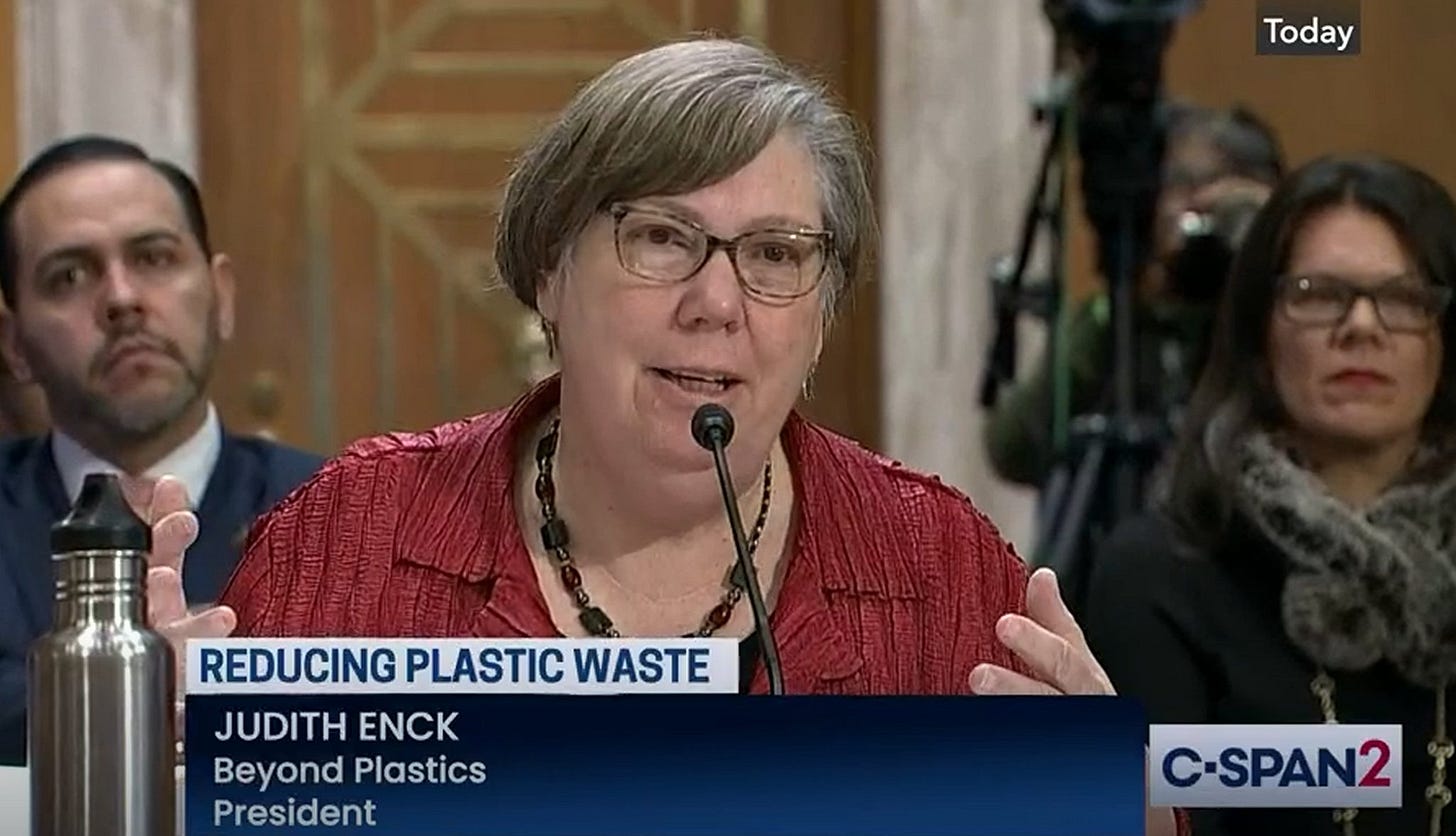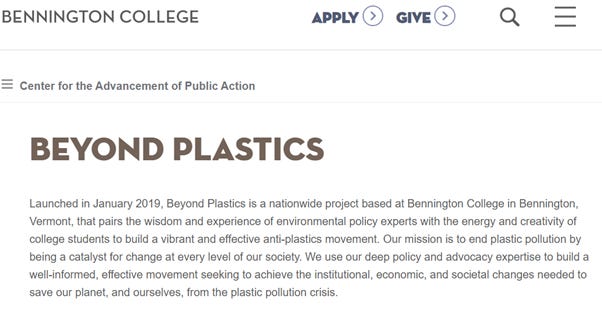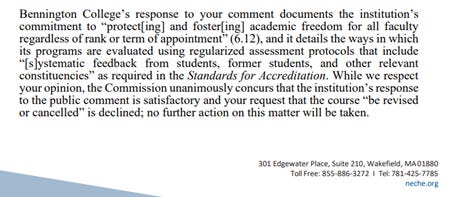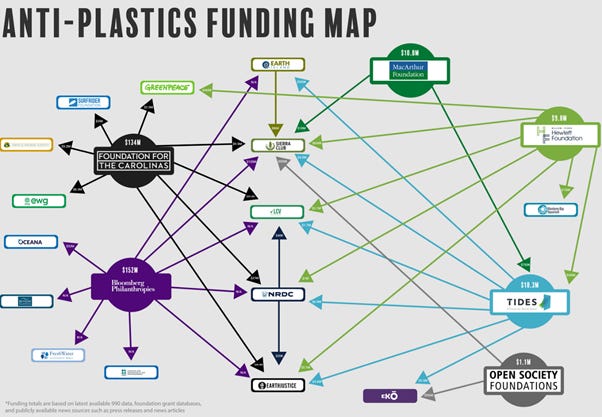Beyond Plastics: A Phantom NGO
The Future of Environmental Activism is Dark, Non-Transparent and Not Liable
Tucked away in the quaint folds of Vermont’s Bennington College, a tiny liberal arts school with fewer students than a bustling high school, lurks a curious specter: Beyond Plastics. It struts the stage of environmental activism—lobbying Congress, staging protests, issuing glossy reports—yet, poof! It’s not an NGO at all, but a “project,” a wispy mirage conjured by fiscal sponsors flush with millions from shadowy foundations.
With no legal standing, no offices, and no accountability, Beyond Plastics operates in a twilight zone where transparency is unnecessary and consequences are for others. It’s a beguiling act, this phantom advocacy, and one wonders: in the theater of environmental do-goodism, who’s pulling the strings, and why are we all still clapping?
The story begins with a network of wealthy, ideological foundations, a secret club where big-money donors use accounting tricks to fund projects without anyone knowing who’s really in charge—a phenomenon we've dubbed “philanthropic activism.”
In essence, rich power players like Michael Bloomberg hide behind donor-advised funds and fiscal sponsors, which are like middlemen who collect cash from wealthy foundations to quietly start or run environmental NGOs or media outlets. A fiscal sponsor doesn’t just grab the money—they also help plan and manage these projects, like a behind-the-scenes coach. Big foundations are teaming up, pouring millions into campaigns, but they only have to share what they’re doing if they feel like it, and, unsurprisingly, most don't.
But here’s the wildest part: a fiscal sponsor can run a project without it ever becoming an official organization—no messy politics, no annoying board members, and no legal responsibility to say where the money’s coming from.
These sponsors are often linked to nonprofits like universities, so all their work is tax-free, even if the “group” they’re funding doesn’t, technically, exist. Yet, the people running these projects act like they’re leading legit community organizations. It’s a shady corner of the activism world that needs a serious cleanup to stop these hidden power plays.
Beyond NGOs
Beyond Plastics is a pseudo-organization that has abused the loophole from which it operates, pretending to be an NGO while flouting established standards of transparency and accountability all while complaining about industry's supposed “behind the scenes” lobbying efforts. As we'll see, Beyond Plastics is a “Phantom NGO” carrying on a charade meant to obscure its own unethical behavior.
“A nationwide project based at Bennington College”
I only found out by accident that Beyond Plastics was a charlatan front group when I had contacted them to ask how much of each donation went to the small liberal arts college (2024 enrollment: 797 students) listed on the Beyond Plastics donation page. I was writing an article about how academic institutions were getting into the fiscal sponsorship game and I was drawn to Bennington’s activist-oriented curriculum, the presence of their Center for the Advancement of Public Action that trains activists and the requirement that each student spend a two-month fieldwork term doing some civil society driven work.
The reply I got from Bennington was not only a number (10% off the top of every donation), but that the college also provided all of the administrative support. Bennington College was not only the fiscal sponsor for Beyond Plastics, it was the only legal entity. The reply informed me that Beyond Plastics was not a registered organization, not a 501(c)3 charity, or, well, anything at all. Beyond Plastics has no offices (using only the Bennington College main address) and employed no people. The 18 Beyond Plastics employees are all managed by the school (with added administrative fees), right down to the email addresses that the staff used: @bennington.edu.
Beyond Plastics is a phantom NGO.
If you read their documents carefully, no one ever said Beyond Plastics actually existed as an organization. On the Bennington College website, they claim that it is a “nationwide project based at Bennington College.”
In an almost identical text from another foundation funding Beyond Plastics, the word “project” was changed to “initiative.” They employ 18 people, manage millions in foundation funding, lobby governments and run large campaigns … but still they hide under such wordplay.
But if Beyond Plastics walks like a (PVC) duck and talks like a (PVC) duck, then it is an NGO. How can they organize campaigns, hold demonstrations in front of the EPA offices, publish reports using the name: “Beyond Plastics” as the source if they do not, technically, exist? How was their founder and president, Judith Enck, allowed to testify to Congress representing a civil society organization that did not, technically, exist? Judith must be exhausted from all of the years of lying and hiding.

Beyond Plastics was “formed” six and a half years ago, employs 18 people and receives tens of millions of dollars from foundations like Bloomberg Philanthropies and Rockefeller Brothers Fund. Why do they still hide under the protective wing of little Bennington, a college tucked away in a small Vermont town rather than becoming a legitimate non-profit organization with offices in Washington or New York?
I have a few ideas.
Beyond Transparency
A fiscal sponsor like Bennington College will manage all the donations and expenditures of a project like Beyond Plastics, subsuming them within the entire academic budget. There are no IRS filings, no declarations of who is funding them and no transparency on their activities. Nobody can ask these questions because Beyond Plastics does not, technically, exist.
Beyond Plastics must have a financial report. I can’t imagine foundations giving them millions of dollars without having confidence their funds are being properly managed. But the management of Beyond Plastics feels that the media, policymakers and the public do not have a right to see this information.
This is important since a group campaigning to phase out plastics would prove to be very beneficial to industries with alternatives (like steel, copper, glass and aluminum). Or rather, these industries could be helping a group campaigning to phase out plastics. In a previous article on such competitive manslaughter, I referred to such businesses who use NGOs to attack their competitors as the worst of the worst.
If, for example, an industry would benefit from the phasing out of plastic in, say, water pipes or automotive and construction materials, they could donate to Bennington College (or via a dark, donor-advised fund or … via a “strategic communications” consultancy they share with Beyond Plastics) and no one would know the source of the funding. If they were to support or ghost-write a report that promoted alternatives to plastics, and the author of the report is “Beyond Plastics,” how could the media, government or public be made aware of such collusion?
Other questions about such dark activist groups should be asked:
Why do regulators treat Beyond Plastics lobbyists as legitimate stakeholders and allow representatives from this phantom NGO to participate in policy discussions?
Why doesn’t anyone in the media ask these questions or take the leadership of Beyond Plastics and Bennington College to task?
Why are large foundations, from Bloomberg Philanthropies to Rockefeller Brothers Fund, donating millions to a “project” with no public records for due diligence or scrutiny?
It is in the interest of the activists behind the anti-plastics movement to keep their own organization as dark and undeclared as possible. And a phantom NGO is about as dark as you can get. But then these same activists complain about industry not being transparent. Pot, Plastic Bottle, Black.
Beyond Accountability
After my article on Bennington College, I was contacted by a representative from the plastic industry who shared his experience with the college. The Beyond Plastics report against PVC water pipes not only misleadingly promoted steel and copper pipe alternatives but made a series of false and libelous claims about PVC. Their documents, press kits and campaigns were riddled with falsehoods and claims that lacked evidence. The plastic industry representative wanted to file a complaint ... but when the source of the false claims does not, technically, exist, to whom do you complain?
Given that Judith Enck teaches a six-week course each year based on the Beyond Plastics documents, the industry representative wrote to Bennington College and to its academic accreditation organization (NECHE – the New England Commission of Higher Education) to protest the false claims and misleading campaigns of an adjunct running an organization (sorry, a “project”) under the Bennington umbrella.
After a bit of to and fro between administrators and the college, they concluded that the false claims against PVC made in the Beyond Plastics documents, and by Judith Enck in the name of the college, could be defended as expressions based on “academic freedom,” as their response pictured below shows.
Bennington College stood by Judith Enck even though she was merely an adjunct teaching only one six-week class a year, with course titles like “Beyond Plastics” (often online because Enck does not live in the state of Vermont). I suppose the commissions from all that foundation funding for Beyond Plastics is just too good for little Bennington College to cut ties and defend academic integrity.
Beyond Lawsuits
An organization making false claims costing an industry billions in lost revenue could rightly be sued and held liable for damages. But what if the organization making those false claims does not, technically, exist? As a “nationwide project,” if Beyond Plastics were ever taken to court, they would just shut the project down or find another fiscal sponsor. I suspect there is some fine print about this in some contract at Bennington College.
Nothing to see here people, move along.
It is one thing to say that Beyond Plastics cannot be held accountable for the veracity of their politicized claims, but could Bennington College be held liable for damages and lost business due to false claims made by their Beyond Plastics “project”? That is an interesting question.
A bit of a back story: At the time of the Beyond Plastics PVC pipe report, Judith Enck was actively pressuring her ex-colleagues in the EPA to ban PVC water pipes while there was a federal program funding infrastructure renewal and replacing all lead municipal water pipes. False claims in an activist report and Judith Enck’s misleading testimonies in a Congressional hearing could damage the prospects for the obvious alternative to expensive copper piping. But Beyond Plastics was beyond accountability.
There would be no point for the plastics industry to sue Bennington College with its 797 students. Enck would just move her little honeypot to another fiscal sponsor and continue to slander industry without ever being held accountable. What about suing other industries and “strategic consultancies” working behind the scenes with Beyond Plastics for the benefit of the alternatives to plastics? Ah, for that, there would need to be some transparency and declarations of interests. Enck prefers to operate in the shadows.
Beyond Pipes
But it's not just pipe that Beyond Plastics is fibbing about. The “group” also maligns, of all things, bottled water and other consumer plastics as a collective villain in its grand anti-corporate conspiracy. “The bottled water industry is a juggernaut. More than 1 million bottles of water are sold every minute around the world and the industry shows no sign of slowing down,” Enck’s project crowed in a recent press release.
What this rhetoric overlooks is that bottled water is popular precisely because it meets the diverse needs of millions of people around the world every day. As we saw during the blistering wildfires in LA early this year, clean, affordable bottled water is essential during disasters when municipal water systems fail.
Even on a daily basis, bottled water is essential. When the public has convenient access to it, they consume far fewer calories – five trillion fewer, in fact – and they’re much more likely to remain hydrated. The benefits of maintaining a healthy weight are well known; however, hydration is a vitally important but often overlooked aspect of public health. “In one study,” the National Institutes of Health notes, “middle-aged people who were not adequately hydrated were more likely to develop chronic diseases … heart failure, diabetes, chronic lung disease, and dementia.”
Importantly, when activist outfits like Beyond Plastics get their way and access to bottled water is restricted, people drink more sugary beverages and their use of plastic increases. Public health and the environment suffer, in other words.
Further, it's beyond rich for Beyond Plastics to characterize the bottled water industry as a “juggernaut.” Why? Because Enck’s outfit belongs to a sprawling network of activists backed by billionaires—to the tune of about $340 million (see image below). This river of cash funds a wide variety of lobbying activities including local demonstrations, public testimony, academic research, external PR support, and fawning media coverage.
Those efforts target both the production and use of consumer plastics like bottled water, despite solid evidence showing that plastic is significantly more sustainable than alternative materials.
But evidence really doesn't matter, because “influence” is the name of the game. If Enck and her acolytes can effectively buy the public square with Michael Bloomberg's money, there's no need to confront science that refutes their conspiracy mongering. It'd be a shame if someone exposed their scheme in graphic detail.
Beyond Morality
Running an activist organization that doesn’t, technically, exist so that you don’t have to be transparent, accountable to facts and evidence or held liable for the consequences of your campaigns may strike some people as just a bit immoral. But the people involved in running this “project” are righteous zealots who feel that they are fighting a crusade against industry, against chemicals in the environment and against what they perceive as capitalist greed. When they identify themselves as noble leaders in the fight for justice (of brave Moms standing up to fight for their children and Mother Nature), then lying, ignoring evidence and pretending that your phantom NGO actually exists can be easily justified. Anyone who questions the righteousness of their crusade or challenges the dogma of their ideology are simply paid industry shills (ie, evil trolls).
And then there is the massive amount of money coming into this “project” making matters only worse. Administrators in Bennington College, a tiny private college which almost faced closure in the 1990s, have shown themselves to be more than willing to pocket 10% commission plus management fees from the millions in foundation funding at the price of academic integrity. If things get messy, they just have to look away and declare “academic freedom.” The number of foundations lining up to fund their activism only reinforces their strategy of running an illegitimate organization devoid of values or honesty.
Is this charade of an organization via greedy fiscal sponsors the new blueprint for NGOs? So long as there is no media or regulatory scrutiny, so long as the microphones stay turned on, and so long as the money keeps flowing, I can understand how attractive this approach can be. And as long as these zealots get away with it, the more convinced they become that everyone else is too stupid to notice. We have to stop lauding alms upon these militant mercenaries.
The fact that nobody even within Beyond Plastics ever questions the illegitimacy of the “project” or the lack of morality, transparency or accountability shows how corrupted these activists have become. The propaganda and groupthink they are willingly buying into puts such activists at the level of being a cult. Shouldn’t there be a little voice in the back of these activists’ heads telling them: “You know, what we’re doing here is really not right!”… Crickets.
And let’s not forget the naked ambition. A last reason that Beyond Plastics has remained as a project and never sought legitimacy as an authentic organization is that Judith Enck, herself, was perhaps holding out for something better. She resigned as an EPA regional director in 2017 on the day of Donald Trump’s first inauguration. I suppose she was expecting a better appointment in a new administration. The job offer never came and her “project” keeps stumbling about with this adjunct at little Bennington trying to make noise.
I almost feel sorry for Judith. ... almost.
Some Simple Questions
This freedom from accountability is another advantage to operating in the shadows with a phantom NGO. But it raises some important questions:
Should fiscal sponsors be allowed to set up such phantom NGOs?
Should the leaders of such charlatan organizations be allowed to testify in Congress when they don’t have legitimate credentials or represent existing NGOs?
Should leaders of phantom NGOs be allowed to lobby or lead campaigns?
Should they be allowed to hide their funding and their expense allocations?
Should they not be held accountable or liable for false claims that cause serious damage to industries or businesses?
The answer to all of these questions is: Of course not! But still, such phantom NGOs like Beyond Plastics are tolerated. Like many issues in the perversion of philanthropic organizations, the fiscal sponsor game needs to be closed down.






